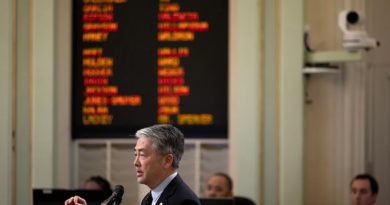Daily Business Report: Friday, April 29, 2022
More real estate development companies
turning Carlsbad into a life sciences hub
An industrial/R&D building in Carlsbad has been acquired for $14 million by Luminous Capital Management, in partnership Virtus Real Estate Capital, for a life sciences conversion.
With existing tenancy at 5931 Priestly Drive expiring in 2023, Luminous and Virtus plan to conduct significant renovations to position the property for bioscience R&D and manufacturing.
The 52,800-square-foot building is located in the Carlsbad Research Center. It was fully leased by two tenants under short-term leases at the time of sale. The property was acquired from locally-based Green Properties.
Earlier this year, the Luminous-Virtus venture acquired 2290 Cosmos Court in Carlsbad for a purchase price of $9.6 million, also with a life sciences conversion plan.
“We have witnessed significant North County life sciences demand, including many tenants seeking bioscience manufacturing space. Our new acquisition at Priestly Drive is well positioned for those users seeking a mix of R&D and cGMP space,” said Matt Stephenson,
a founding principal of Luminous.
Virtus provided joint venture equity for the renovation and repositioning with the investment representing the third acquisition of the partnership in greater San Diego. Last September, Luminous and Virtus acquired 10225 Willow Creek Road, a 75,000-square foot R&D building which is also undergoing a conversion to life science use.
Greene Properties was represented in the sale of the building by Michael Nucci of RW Commercial, while the buyer was represented by Chris Baumgart of JLL who will handle leasing of the property.
TOP PHOTO: The building at 5931 Priestly Drive in Carlsbad will be converted into a life sciences center by Luminous Capital Management and Virtus Real Estate Capital.
Qualcomm in Q2: Double-digit growth in handsets, automotive
Last year Qualcomm laid out a plan to leverage its core expertise well beyond the handset market it’s best known for to grow share in complementary sectors; specifically the idea is to go from a $100 billion total addressable market to a $700 billion in the next decade.
Based on Q2 financials reported Wednesday, the plan is working as the San Diego-based technology company showed across-the-board double-digit growth with a strong outlook and despite headwinds associated with supply chain entanglements, geopolitical concerns, COVID-related uncertainty, and other externalities.
To the numbers: Total revenues hit $11.164 billion up 41percent year over year. By segment, handset revenue grew 56 percent to $6.325 billion, RF front-end grew 28 percent to $1.16 billion, automotive grew 41percent to $339 million, and IoT grew 61percent to $1.724 billion. From RCR Wireless
Low income homeowners can get loans
to build accessory dwelling units on their property
Homeowners with low income in the City of San Diego who want to build accessory dwelling units (ADU) on their property can now apply for a new San Diego Housing Commission (SDHC) program that provides low-interest loans and no-cost technical assistance to help them with the process.
The application for SDHC’s Accessory Dwelling Unit (ADU) Finance Pilot Program is available now through SDHC’s website at www.sdhc.org/adu.
The SDHC ADU Finance Program provides eligible homeowners with loans of up to $200,000 per household. In addition, SDHC will provide technical assistance through a consultant, at no cost to the homeowner, to help with predesign, permits and construction.
Property owners participating in SDHC’s ADU Finance Pilot Program may generate wealth for themselves through the increase in their property’s value and the rental income from their ADU.
“This pilot program has the potential to provide the dual benefit of creating more homes for San Diegans and provide an opportunity for low-income homeowners to earn money and build wealth,” said San Diego City Council President Sean Elo-Rivera.
National Fusion Facility adds tool to
resolve heat handling in power plants
Researchers at the DIII-D National Fusion Facility, the largest magnetic fusion research facility in the United States that is operated by General Atomics in San Diego, are preparing to test a new method to enable future fusion power plants to withstand the fierce conditions of heat and particle flow created by the fusion reaction. Solutions such as this will be critical to developing practical fusion energy.
Current fusion power plant designs envision using tungsten as a key component in the reactor vessels because of its high resistance to heat and radiation. However, tungsten is also an impurity for the fusion reaction and can impair performance. The new approach researchers are testing will leverage an existing component on DIII-D, known as the Small Angle Slot (SAS) Divertor, to minimize tungsten erosion and release into the plasma.
“Developing robust wall materials is absolutely necessary for economic fusion energy,” said Dan Thomas, a scientific manager at DIII-D who is helping to coordinate the multi-institution effort on these new experiments.
Scripps launches program to support
community college students in geosciences
Scripps Institution of Oceanography recently launched a new program designed to foster opportunities in geosciences for community college students. The Scripps Geosciences Educational Opportunities (Scripps-GEO) program connects undergraduate students currently enrolled in San Diego-area community colleges with research experiences at Scripps in an effort to give them more experience and knowledge in the field of geosciences.
The Scripps-GEO program first came to life in 2020, when it was funded by the National Science Foundation’s GEOPAths program. The concept for a community college-focused program was developed by Program Director Jane Teranes, who had been looking for answers on how to increase the number of geoscience majors at Scripps.
Students participating in the program are cross-enrolled between their community college and UC San Diego, where they can receive credit for taking SIO 65, Geosciences Seminar. In this seminar, students have the opportunity to learn about entering the geosciences field. Guest speakers are a key component of the course. They share insight on different career paths, how to apply for research and education opportunities, how to analyze scientific papers, and how to craft a strong resume. They also lead tours of the research facilities at Scripps, including the iconic Scripps Pier.
Kratos awarded contract to deliver spectrum
monitoring system for OneWeb
San Diego-based Kratos Defense & Security Solutions Inc. has been awarded a contract to deliver an advanced spectrum monitoring system for OneWeb to monitor, analyze and review the utilized spectrum to support high quality of service for its fleet of Low Earth Orbit (LEO) constellations.
The system will monitor the spectrum used between its global network of Satellite Network Portal (SNP) gateways and its constellation of LEO satellites. The OneWeb Spectrum Monitoring System (OSMS) will help staff monitor, manage and analyze this spectrum, the radio frequencies that satellite signals travel over.
“With our fleet of LEO satellites that will deliver on our mission to provide space connectivity around the world, it is critical for us to monitor and manage the RF spectrum to ensure that we are delivering on our service performance targets,” said David Price, vice president at OneWeb. “We are working with Kratos, experts in RF monitoring, measurement and analysis to design, build and integrate the system into our ground operations.”
California adds 17 Israeli-founded unicorns,
now home to 32 total
California now hosts the global or U.S. headquarters for 32 Israeli-founded unicorns —privately held companies valued at $1 billion or more — according to the United States – Israel Business Alliance. Over the past 12 months, the Golden State added 17 unicorns, the vast majority of which are in Silicon Valley. The 32 total companies form an unprecedented cluster of Israeli-founded unicorns in a single state.
Over the past year, 16 companies reached or surpassed the billion-dollar valuation threshold: At-Bay ($1.35 billion), BigPanda ($1.2 billion), Cloudinary ($2 billion), Exabeam ($2.4 billion), Firebolt ($1.4 billion), Hailo ($1.1 billion), Honeybook ($2.4 billion), Noname Security ($1 billion), Placer.AI ($1 billion), RapidAPI ($1 billion), Salt Security($1.5 billion), SpotOn ($3.2 billion), Sunbit ($1.1 billion), Veev ($1 billion), Viz.ai ($1.2 billion), and Wiliot ($1 billion).
California picked up an additional unicorn when Cato Networks($2.5 billion), a company valued at more than $1 billionsince November 2020, relocated its headquarters from Alpharetta, Ga to San Jose.
New cancer-fighting technology
comes to Sharp Grossmont Hospital
The David & Donna Long Cancer Center at Sharp Grossmont Hospital has added one of the most advanced radiation therapy systems to combat cancer — the Accuray Radixact System with new Synchrony Motion Synchronization and Real-Time Adaptive Radiotherapy technology. Designed to treat a broad range of cancer anywhere in the body, the Radixact system targets tumors with exact precision, even while moving, to help protect surrounding healthy tissue and organs.
“Sharp Grossmont has made an investment in state-of-the-art technology to fight cancer and in the East County community. This new technology ensures anyone faced with a cancer diagnosis can receive the best possible care, close to home, and in their own community,” sasid Dr. Kelly DeWitt, board-certified radiation oncologist and medical director of the Sharp Grossmonth Department of Radiation Oncology.
San Diego Museum Council’s Big
Exchange program returns in May
The San Diego Museum Council has started its popular Big Exchange program, which offers free reciprocal admission for a limited time to members of 40+ cultural destinations all around San Diego County, including museums, gardens, historic sites, zoo/aquariums and more. The program runs from May 1 to May 18, which is International Museum Day.
During the Big Exchange, members of any of the participating organizations can simply head to another participating museum and show their membership card for complimentary reciprocal admission.
Each membership is reciprocal per guest or membership status. For example, a single membership would enjoy a similar access for one attendee at a participating museum. A family membership might enjoy entrance for up to four guests at another participating museum.
The Balboa Park Explorer Pass or Go San Diego Card will not be accepted as part of this program. Reciprocal admission requires proof of current membership from one of the participating museums.
For more information, visit sandiegomuseumcouncil.org.
Plexium collaborates with Abbvie to develop
therapies for neurological conditions
San Diego-based Plexium Inc. is collaborating ith AbbVie to develop and commercialize novel Targeted Protein Degradation (TPD) therapeutics for neurological conditions. This collaboration combines AbbVies extensive neuroscience capabilities with Plexium’s comprehensive TPD platform that enables the discovery of novel therapies toward historically challenging drug targets.
Under the terms of the collaboration, Plexium will conduct preclinical research activities for the collaboration targets, after which AbbVie has the option to select programs for additional research and development activities. Plexium received an upfront cash payment and is eligible to receive additional payments from AbbVie, as well as tiered royalties on commercialized products, and has the option to participate in product development in return for higher royalty rates.
AbbVie will be responsible for development and commercialization globally of products resulting from the collaboration.
More than 12,500 season tickets are sold
for upcoming 2022 football season at SDSU
San Diego State Athletics has surpassed 12,500 season tickets sold for the upcoming 2022 football season according to Director of Athletics John David Wicker. The milestone comes as a virtual 3D seat map has been released to the public.
The virtual 3D seat map of Snapdragon Stadium allows fans to take a tour of the seats before reserving season tickets. Fans can peruse available seating or check out where their season tickets will be for the inaugural season in 2022.
Season-ticket sales began in September 2020 coinciding with the opening of the Snapdragon Stadium Experience Center located in Mission Valley. To date, Founders Suites, Luxury Suites, Loge Boxes and the 800-plus person West Club are sold out. Club Seating, meanwhile, is over 80 percent sold and is expected to sell out before the 2022 opener with Arizona on Sept. 3. Season tickets are still available in the Field Club featuring a 50-yard line player’s tunnel and the East Club.
UC San Diego ranked one of top 10
public universities in the country
The University of California San Diego is once again ranked one of the top 10 public universities in the country, according to the Center for World University Rankings (CWUR). In the annual latest rankings, the campus placed No. 8 among public U.S. universities and No. 22 among all universities nationwide.
Overall, UC San Diego was named 34th worldwide on the annual list. The university earned high marks for its faculty rank (13th) and research rank (19th). Some factors that contributed to UC San Diego’s strong showing include the number of research articles in high-quality publications as well as the number of faculty who have won major academic distinctions.
U.S. News and World Report recently named nine of UC San Diego’s graduate programs among the top 10 in the nation as part of its 2023 Best Graduate Schools ranking.




